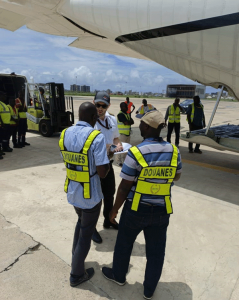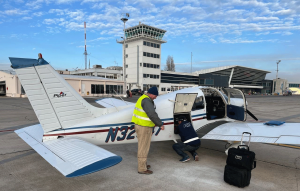Controlling general aviation: the Argentinian and Senegalese Customs Administrations outline the progress made under the COLIBRI Project
29 October 2024
By Boucar Seck, First Lieutenant , Senegalese Customs Administration and Mauricio V. Jáuregui, Head of Customs in Bahía Blanca, Argentinian Customs Regulation and Control Agency (ARCA)The COLIBRI Project, which is aimed at monitoring and controlling general aviation (GA) and combating illicit trafficking perpetrated through GA in Latin America and the Caribbean (LAC) as well as in West and Central Africa (WCA), has been implemented since 2019 by the WCO Secretariat, with the financial backing of the European Union (EU).
GA is a generic term denoting all the operations of civil aviation for purposes other than commercial transport (flying for sport or leisure aviation, private aviation, business aviation and aerial work).
To enable administrative authorities to exercise control over international movements of GA aircraft, national legislatures generally require certain documents to be provided, such as the flight plan, documents on the status of the aircraft, documents on the goods being transported, and documents relating to the persons aboard and their luggage.
However, general aviation is not subject to the same Customs or police inspection mechanisms as commercial aviation. Flight security measures are considerably less stringent, even in areas that are as well-regulated as European countries, which hampers the ability to track flights. What is more, light aircraft often need only rudimentary infrastructure to take off and land. All that is required to allow the most experienced pilots to take off or land is a stretch of flat ground a few hundred metres long and a few dozen metres wide.
This means that GA represents a genuine opportunity for organized crime, offering a number of advantages to traffickers. This is a discreet, fast mode of transport that can use smaller aerodromes, where law enforcement agencies are often absent.
In order to build surveillance and control capacities for this type of transport, the COLIBRI Project team works with each partner country in order to:
- ascertain needs, identifying the teams and training them in intelligence gathering and techniques for targeting and inspecting aircraft in transit at international airports as well as small aerodromes, and even for detecting clandestine airstrips;
- create a real-time operational communication system, facilitating the sharing of information at national and international level;
- populate and use a geospatial database that holds observations, entries and controls carried out on aircraft and provides a basis for the Geoportal, which is a mapping tool that allows the user to visualize all of the data collected in the field using a map (see the article published in October 2021);
- carry out regular surveillance and control operations in the various regions involved in the project to evaluate and strengthen the mechanisms used.
This article collates the operational feedback from the COLIBRI Project focal points within the Customs Administrations of Argentina (ARCA) and Senegal. In particular, they were asked to explain the COLIBRI Project’s impact in terms of heightening awareness among Customs officials and other law enforcement authorities of the threat posed by GA, capacities for combating fraud and transnational organized crime, the level of interinstitutional and international cooperation, and the role of Customs in ensuring coordination between the security forces.
Perspective of Boucar Seck, First Lieutenant, Senegalese Customs Administration
The Senegalese Customs Administration, which is the main administrative body responsible for controlling private aircraft, initiates controls on this means of transport in cooperation with other administrative bodies which are requested to intervene for a variety of reasons; it receives flight plans and landing permits from the air traffic control services and the Air Force, and passenger entry and exit records from the Border Police.
In the past, there has, however, been very little interest in GA surveillance and control on the part of the law enforcement services, in particular the Customs Administration, the chief priority of which remains revenue collection. The work carried out in tandem with the French Customs Administration since 2012 under the African Wings Project, and subsequently with the WCO Secretariat under the COLIBRI Project, has changed matters by raising awareness of the scale of the threats associated with GA and the gaps that exist in relation to controls.

Training workshops on the regulatory framework and the methods and techniques for carrying out controls, targeted training measures, availability of secure communication tools and, finally, participation in high-impact enforcement operations have made it possible to establish a more effective framework. Many lessons have been learned from interactions with counterpart administrations in other countries in the region, as well as in Latin America and Europe.
In particular, one-off operations have made it possible to identify vulnerabilities in our airport infrastructures and weaknesses in our control mechanism for private aircraft. Our officials have furthermore been able to familiarize themselves with the documents that must be submitted by the crews of these aircraft, and have assessed their capacity to use the information contained in these documents. It has become clear that many officials were failing to carry out controls on private aircraft, not because they disliked them, but rather because they lacked knowledge about the regulations in this area as well as the techniques and methods for carrying out controls, and were afraid of breaking rules or breaching obligations.
Since the launch of the COLIBRI Project, the number of controls carried out on private flights to Senegal has risen steeply, and this increase has translated into seizures. Controls have furthermore been extended to secondary aerodromes, following the example of Saly Portudal. Finally, the introduction of training modules on GA controls into the basic and advanced training curricula is evidence of a dynamic new trend.
Although the main target of the COLIBRI Project is illicit trafficking, to date the controls have uncovered a large number of tax offences: importing undeclared aircraft, and fraud on temporary admission and refuelling.
Not only have GA controls become part of the day-to-day activities of the Customs Administration, they have also become more effective thanks to the stepping up of cooperation and the exchange of information. The regional workshops and high-impact operations organized under or on the fringes of the COLIBRI Project have served as an opportunity for participants to establish contacts with key individuals.
The COLIBRI Project has promoted inter-agency cooperation at both national and international level. For example, by the close of the WCO’s workshops in Senegal, the Customs enforcement services and the air traffic control service had established a framework for sharing flight plans and landing permits for private flights.
The Geoportal makes it possible to translate this spirit of cooperation into the exchange of specific information. For example, an “observation” was uploaded to the Geoportal by a user from Côte d’Ivoire in relation to an aircraft; despite serious grounds for suspicion, it had not been possible to carry out a control of this aircraft due to the fact that its technical stop had been delayed. Since the aircraft was expected in Senegal, the Senegalese Customs officials submitted the relevant query to Geoportal and found this “observation”. This resulted in a control being carried out, which in turn led to the discovery of aircraft parts that had entered the territory without preliminary Customs formalities.
All GA-related intelligence has a relatively short shelf life given the transient nature of the malicious actions linked to this means of transport. In this area more than any other, “information is a perishable good”. The Geoportal provides an effective means of communication in this respect.
Perspective of Mauricio V. Jáuregui, Head of Customs in Bahía Blanca, Argentinian Customs Regulation and Control Agency (ARCA)
In an article that was published in June 2023, the Argentinian Customs Administration outlined how the various agencies responsible for protecting the country’s territory cooperated among themselves. At the end of the article, the author underlined the importance of also deepening inter-agency relationships at the international level, referring to the Customs Administration’s participation in projects to promote international collaborative work and the active exchange of information, including the COLIBRI Project.
As a fast and discreet means of transport, GA is a strategic tool for conveying illegal substances and avoiding border controls. After rejoining the COLIBRI Project in 2019, the Argentinian Customs Administration rapidly identified a number of problems, including a lack of knowledge about the risks associated with this means of transport, little experience of carrying out controls on aircrafts and a lack of official information and specific regulations concerning such controls.
Irregular air traffic involves several countries and jurisdictions, and it became clear very quickly that an effective response would require the participation of the intelligence services, the security forces and the Customs authorities in various countries. It is precisely here that the main strength of the COLIBRI Project lies. By promoting a multidisciplinary approach, it succeeds in enhancing synergies between the various fields of knowledge and the capacities of participating agencies, thus producing a more effective and comprehensive response.

The joint operation carried out by Argentina and Uruguay in 2022 serves as a good example in this regard. Thanks to the coordinated work of the Customs authorities in the two countries, the Argentine National Gendarmerie, the Uruguayan Air Force and the National Police of Uruguay, a major criminal syndicate specializing in the trafficking of drugs in South America was broken up. This was made possible by the rapid exchange of information, the analysis of risks and the use of innovative investigative techniques, all of which were facilitated via cooperation under the COLIBRI Project and the tools made available, namely the Geoportal, its mobile app and the communication tool CENcomm.
High-impact operations such as “COLIBRI Rutilant” (January 2023) have provided an opportunity to confirm the effectiveness of the mechanisms and working methods that have been put in place, resulting in the seizure of large quantities of illegal substances and aircraft used by criminal networks.
Under the COLIBRI Project, Customs administrations – and their officials – also play a coordination and advocacy role in their respective countries when engaging in collaborative work at international level.
Implementation of the COLIBRI Project has had multiple impacts on all of the countries in the region:
- The training and capacity-building measures under the COLIBRI Project have made it possible to heighten participants’ awareness of the severity of the problem and to encourage greater cooperation between the various governmental agencies.
- In certain cases, based on the visualization of the problem, a process was launched with the aim of comprehensively reviewing the current regulations on GA control.
- The existing control processes are currently being evaluated in order to identify potential gaps and propose improvements.
- The technological tools made available under the COLIBRI Project have revolutionized control processes and encouraged officials to learn new skills.
With reference to the last of these points, use of the Geoportal has made it possible to assess the problem in terms of its scale and visualize it holistically. Geolocation has promoted collective knowledge production by facilitating a better understanding of the regional situation and the distribution of threats. Something that should be emphasized in this connection is the remarkable and inspirational use of this computer-based tool by the Colombian Air Force to detect clandestine runways in the inaccessible region of the Amazon.
Regional cooperation on training has also been stepped up under the COLIBRI Project; for example, agencies from Argentina, Uruguay and Brazil have engaged in joint measures, allowing them to share their experiences and practices.
Specialized training programmes have been developed in order to ensure that they respond to the challenges faced by the region as a whole while also being tailored to the special features of each country. In the case of the Argentinian Customs Administration, for example, the relevant training programmes have been integrated into the national syllabus for the Customs officials and security forces involved in the project. This approach has made it possible to optimize resources and efforts while boosting the impact of the training measures, by standardizing procedures and improving the detection rate for suspicious aircraft.
A further key factor in ensuring the sustainability and impact of the project has been the establishment of an expert panel made up of officials selected by each of the participating countries. This panel has a great deal of experience and in-depth knowledge of the special features of their respective settings. These experts ensure that the knowledge they gain in the course of their work together is transferred to national level. They provide training and advice to their colleagues, with a view to replicating best practices and adapting them to the specific needs of each country. As well as ensuring knowledge sharing, this means that a network of highly qualified and committed experts is being established.
Another extremely important aspect that should be emphasized in relation to the COLIBRI Project is the involvement of individuals representing prosecutors specializing in drug offences. They play a vitally important role in terms of guaranteeing the effectiveness and sustainability of the fight against drug trafficking and other illicit activity. By guaranteeing the lawfulness of measures, strengthening inter-institutional coordination and speeding up legal procedures, these individuals help to make criminal prosecutions more effective. What is more, their involvement promotes crime prevention by acting as a deterrent and guarantees respect for human rights at all stages of the investigation, the operational procedure and the following criminal proceedings.
It is an indisputable fact that the COLIBRI Project has laid the foundation for stronger and longer-term regional cooperation of the sort necessary to fight transnational organized crime. It is crucially important to continue investing in technology and training and to strengthen national legal frameworks in order to ensure the sustainability of these efforts and extend their scope to other regions of the world.
More information
Drugsprogramme@wcoomd.org


